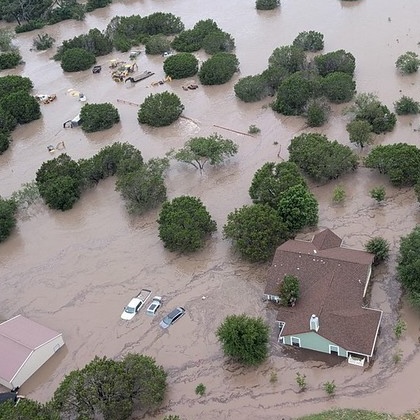Science
Climate Report Warns of Urgent Action Needed to Avert Crisis

A new report from an international coalition led by scientists from Oregon State University has revealed that 2024 is likely the hottest year on record, marking a critical moment in the ongoing climate crisis. The findings, published today in the journal BioScience, indicate that Earth is on a dangerous trajectory, with serious implications for global health, governance, and ecosystem stability. Co-lead author William Ripple warns, “Without effective strategies, we will rapidly encounter escalating risks that threaten to overwhelm systems of peace, governance, and public and ecosystem health.”
The report, titled “The 2025 State of the Climate Report: A Planet on the Brink,” highlights alarming data showing that 22 of the planet’s 34 vital climate indicators are at record levels. Among these, greenhouse gas concentrations, ocean acidity, and ice mass are trending sharply in the wrong direction. Despite these troubling findings, Ripple emphasizes that it is not too late to mitigate the worst outcomes, even if global temperatures exceed the goals set by the 2015 Paris Agreement.
Key Recommendations for Action
Urgent action is needed to implement effective climate mitigation and adaptation strategies, the report states. Ripple suggests embedding climate resilience into national defense and foreign policy frameworks. Additionally, he calls for grassroots movements advocating for a socially just phase-out of fossil fuels and limiting the fossil fuel industry’s financial and political influence.
The report is based on data from the Intergovernmental Panel on Climate Change, a United Nations body responsible for assessing climate science. It outlines several high-impact strategies that can significantly reduce carbon emissions:
1. **Energy Transition**: Renewable energy sources, such as solar and wind, could supply up to 70% of global electricity by 2050. A rapid phase-out of fossil fuels is identified as one of the most impactful actions for climate mitigation.
2. **Ecosystem Restoration**: Protecting and restoring vital ecosystems, including forests and wetlands, could remove or avoid about 10 gigatonnes of carbon dioxide emissions annually by 2050, equating to roughly 25% of current emissions.
3. **Sustainable Food Systems**: Reducing food waste, which constitutes about 8-10% of global greenhouse gas emissions, alongside a shift towards more plant-rich diets, could lower emissions while enhancing human health and food security.
Co-lead author Christopher Wolf remarked on the urgency of the situation, stating, “The human enterprise is in a state of ecological overshoot where the Earth’s resources are being consumed faster than they can be replenished.” With population growth and consumption rates at all-time highs, the report underscores the need for transformative and equitable changes across various sectors of society.
Escalating Risks and Urgent Timeline
The findings also reveal that fossil fuel energy consumption reached a record high in 2024, while combined solar and wind consumption, although at a new record, remains significantly lower than fossil fuel usage. The report details how warming is accelerating, likely driven by reduced aerosol cooling and shifts in cloud behavior. Ocean heat content and wildfire-related tree cover loss have also reached unprecedented levels.
The report paints a dire picture of recent climate-related disasters, with Texas floods resulting in at least 135 deaths and wildfires in Los Angeles causing damages exceeding $250 billion. Additionally, Typhoon Yagi claimed more than 800 lives in Southeast Asia, illustrating the human toll of climate inaction.
The European Union has already experienced its most extensive wildfire season on record by August 2025, burning over 1 million hectares. The weakening of the Atlantic Meridional Ocean Overturning Circulation poses further threats to global climate stability.
The authors stress that every fraction of a degree of avoided warming matters significantly for human and ecological well-being. They note that small reductions in temperature rise can notably decrease the risk of extreme weather events, biodiversity loss, and food and water insecurity.
Ripple concludes with a stark warning: “The cost of mitigating climate change is likely much smaller than the global economic damages that climate-related impacts could cause.” He emphasizes that coordinated, immediate action can yield significant benefits for communities and ecosystems worldwide. The window for effective intervention is closing rapidly, making it imperative for all stakeholders to act swiftly and decisively.
-

 Science2 weeks ago
Science2 weeks agoResearchers Challenge 200-Year-Old Physics Principle with Atomic Engines
-

 Politics2 weeks ago
Politics2 weeks agoNHP Foundation Secures Land for 158 Affordable Apartments in Denver
-

 World4 days ago
World4 days agoBoeing’s Aircraft Production: Assessing Numbers and Challenges
-

 Health2 weeks ago
Health2 weeks agoNeuroscientist Advocates for Flag Football Until Age 14
-

 Lifestyle2 weeks ago
Lifestyle2 weeks agoLongtime Friends Face Heartbreak After Loss and Isolation
-

 Entertainment4 days ago
Entertainment4 days agoSyracuse Stage Delivers Lively Adaptation of ‘The 39 Steps’
-

 Science4 days ago
Science4 days agoAI Misidentifies Doritos Bag as Gun, Triggers Police Response
-

 Lifestyle4 days ago
Lifestyle4 days agoRed Bluff High School’s Elli Nolan Named Rotary Student of the Month
-

 Lifestyle3 days ago
Lifestyle3 days agoTrump’s Push to Censor National Parks Faces Growing Backlash
-

 Business2 weeks ago
Business2 weeks agoSpirit Airlines Cuts Workforce with Furloughs for 365 Pilots
-

 World2 weeks ago
World2 weeks agoGlobal Military Spending: Air Forces Ranked by Budget and Capability
-

 Top Stories5 days ago
Top Stories5 days agoUrgent Search for Suspect Who Exposed Himself to Teen Girl









